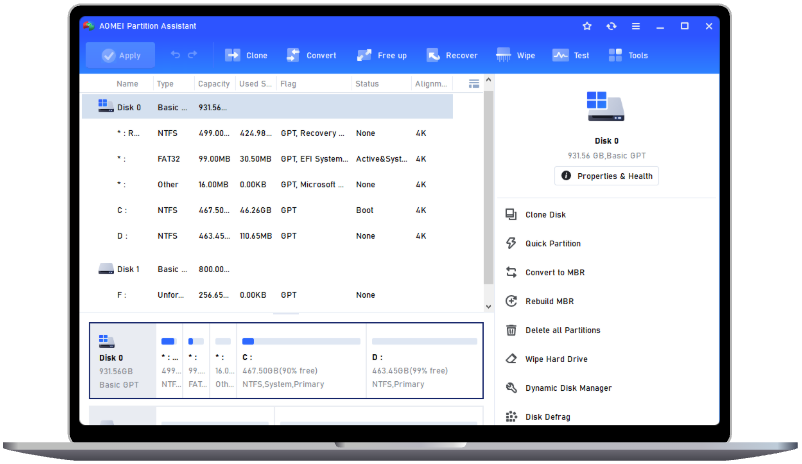How to Scrub a Hard Drive for Maximum Data Security?
This guide provides a detailed overview of how to scrub a hard drive securely. Whether you're preparing a drive for resale or secure disposal, it will help safeguard your privacy and prevent unauthorized access to your data.
What Does Scrubbing a Hard Drive Mean?
Imagine you’ve just bought a new laptop, and your old one is still in perfect working condition. To recoup some of the cost, you decide to sell it. But before handing it over to the buyer, you want to ensure that your personal information—documents, photos, saved passwords, banking details, and even browser history—is completely erased. That’s where scrubbing a hard drive comes in.
Unlike simply deleting files or formatting partitions, scrubbing a hard drive involves overwriting all data on the drive multiple times to ensure it’s irrecoverable. In other words, once a drive is scrubbed, the data cannot be retrieved, even with professional recovery tools. If you’re wondering how to scrub a hard drive, keep reading for effective solutions.
Preparation Before Scrubbing Your Hard Drive
Before you start scrubbing your computer hard drive, take these essential precautions to avoid unexpected data loss and system failure.
Backup Important Data
First and foremost, back up files you may want to keep. Scrubbing a hard drive is irreversible, and once the process begins, all stored data will be permanently erased.
Identify the Correct Drive
Double-check which drive you plan to scrub, especially if you have multiple internal or external drives. It is easy to scrub the wrong one accidentally. It's easy to accidentally scrub the wrong one, which could lead to unwanted data loss.
Prepare Bootable Media
If you're trying to scrub the drive that contains your operating system (usually the C: drive), you can't erase it while it's running. In this case, you’ll need to boot into Windows PE or create a bootable device and boot from it.
How to Scrub a Hard Drive Securely?
Now that you’re fully prepared, let’s walk through how to scrub a hard drive securely. One of the most reliable tools for this task is AOMEI Partition Assistant—a professional yet user-friendly disk management software. It includes a powerful “Wipe Hard Drive” feature that lets you overwrite all data using multiple secure erasure methods, including the DoD 5220.22-M standard recommended by the U.S. Department of Defense. With this tool, you can securely wipe all your data and ensure that it cannot be recovered by any means.
Here’s how to scrub a computer hard drive using AOMEI Partition Assistant:
Step 1: Download and install AOMEI Partition Assistant. After launching it, you’ll see a clear interface showing all the connected drives on your PC.
Step 2: Click the "Wipe" main tab and select the "Wipe Hard Disk" option.
Step 3: Select the disk you want to scrub and click "OK" to continue.
Step 4: Choose a wiping method according to your requirements and click "OK".
- AOMEI Partition Assistant provides four wiping methods:
- Fill in 0: Overwrites all sectors on the hard drive with zeros. It’s commonly used for wiping personal hard drives.
- Fill in random information: Overwrites the entire drive with random data. It provides better data protection than zero-filling, making it a good choice for users who want a higher level of security.
- DoD 5220.22-M: Overwrites each addressable sector with binary 0's, binary 1's, and a random bit pattern from once to seven times. It offers a strong balance between security and efficiency, making it a popular choice among companies and organizations.
- Gutmann: Overwrites a hard drive with 35 passes. It is the safest way here, but it also takes the longest time.
Step 5: To commit the "Pending Operations", please click "Apply" and "Proceed". Once the process is completed, your hard drive will be securely scrubbed, and all previous data will be permanently destroyed.
Bonus Tip: Securely Erase an SSD
While traditional overwriting works well for HDDs, SSDs require a different approach due to their unique read and write mechanisms. Thankfully, AOMEI Partition Assistant also supports SSD Secure Erase, which helps you completely clear data on a solid-state drive in Windows 7.
Here’s how to securely erase an SSD with AOMEI Partition Assistant:
Step 1: Connect the SSD to a Windows 7 computer and make sure it is recognized by the system.
Step 2: Launch AOMEI Partition Assistant, click "Wipe"> "SSD Secure Erase" > "Next".
Step 3: Select the SSD you want to erase and click "Next" to continue.
Step 4: Some SSDs may need to be “hot-swapped” during the process. Follow these steps to perform it:
- Open your computer case. For laptops, remove the rear cover or drive shell.
- Locate the SSD that needs to be securely erased.
- Unplug the power cable from the SSD.
- Disconnect the SATA data cable from the SSD.
- Reconnect the SATA cable to the SATA port on the SSD.
- Plug the power cable back into the SSD’s power connector to complete the hot-swap.
Step 4: Finally, click "Next" and then “Proceed” to start the erasing process. Once complete, you will see the SSD shown as a block of unallocated space.
Conclusion
In many cases, simply deleting files or formatting your hard drive isn’t enough. Sensitive data can still be retrieved with professional recovery tools. That’s why scrubbing a hard drive is essential. This post shows you how to scrub a hard drive securely. Follow the correct scrubbing process to ensure maximum data security.
FAQs
Q1: Is formatting the same as scrubbing a hard drive?
No. Formatting drives removes the file system references, but the data still exists on the drive and can often be recovered. Scrubbing involves overwriting the data so that it’s permanently unrecoverable.
Q2: How long does it take to scrub a hard drive?
It depends on the drive’s size and the wiping method. A simple one-pass overwrite might take a few hours, while a multi-pass method like DoD 5220.22-M can take significantly longer.
Q3: Can I scrub the system drive (C:) while Windows is running?
No. The system drive is in active use when the operating system is running, so it cannot be scrubbed while the OS is using it. You must boot from an external environment like a bootable USB drive or move the drive to another PC.


